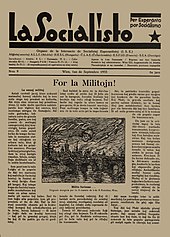Hans Weinhengst
Hans Weinhengst (born June 27, 1904 in Kuffern , Lower Austria , † May 1945 in Berlin ) was an Austrian author , translator , Esperantist and fighter against fascism .
Life
Hans wine stallion developed as a child very interested in other languages , so that it gradually autodidact learned English, Latin, Dutch and Hungarian. From 1927 he also dealt with the planned language Esperanto , which he initially questioned. In 1927 he joined the Grupo Viena 10 , the Favoritner section of workers' independentists. Weinhengst was a member of the Social Democratic Party and active in the resistance struggle of the Austrian workers against fascism. He lived with his wife and a daughter in one of the poorest parts of Vienna's 10th district, Favoriten , in what was then Thavonatgasse 4, since 1935 Kempelengasse, where his novel Turmstraße 4 is also located. The neighborhood was called " Crete " by locals (see Absberggasse # Notable Buildings ).
In 1940 Weinhengst was photographed as an air raid guard in Vienna.
Weinhengst's grave is in the In den Kisseln cemetery in Berlin-Spandau .
Esperanto
Hans Weinhengst belonged next to u. a. the Nobel Peace Prize laureate Alfred Hermann Fried (1864–1921) and the former Federal President Franz Jonas (1899–1974) among the most important Esperantists in Austria . He was a leading member of the socialist Esperanto movement. Weinhengst translated workers' songs into Esperanto and published poetry and stories in Esperanto from the 1920s. He also reported regularly to the Parisian magazine Internacia Socialisto Esperantista to speak, around 1933 with an article against the war. He also wrote the novel Turstrato 4 (dt .: Turmstraße 4 ) of the 1934 Hungarian Esperanto publishing Literatura Mondo was published in September 2017 and for the first time in German translation in the Viennese publisher Edition Atelier has been released.
Own texts (selection)
- Turstrato 4 , Budapest: Literatura Mondo, 1934
- Turmstrasse 4 , Vienna: Edition Atelier, 2017. Translated from Esperanto by Christian Cimpa, with an afterword by Kurt Lhotzky.
- Both the milieu and the plot are reminiscent of texts by Ödön von Horvath
Individual evidence
- ↑ Thomas Mießgang: The Esperantist's dream of a language that liberates all proletarians . In: Die Zeit , No. 40/2017, p. 16
- ↑ wine stallion, Hans († 1945 Berlin) . Esperanto in Berlin and Brandenburg; accessed on 21 Sep. 2017
- ^ Austria Socialista Ligo Esperantista (ASLE). In: dasrotewien.at - Web dictionary of the Viennese social democracy. SPÖ Vienna (Ed.)
- ↑ Information on the website of the Esperanto Association Universala Esperanto-Asocio (UEA)
- ^ Sibylle Fritsch: Proletarians of all countries, come to an understanding , in: Salzburger Nachrichten newspaper , October 20, 2017, p. 7
| personal data | |
|---|---|
| SURNAME | Wine stallion, Hans |
| BRIEF DESCRIPTION | Austrian author, translator, Esperantist and fighter against fascism |
| DATE OF BIRTH | June 27, 1904 |
| PLACE OF BIRTH | Kuffern , Lower Austria |
| DATE OF DEATH | May 1945 |
| Place of death | Berlin , Germany |
